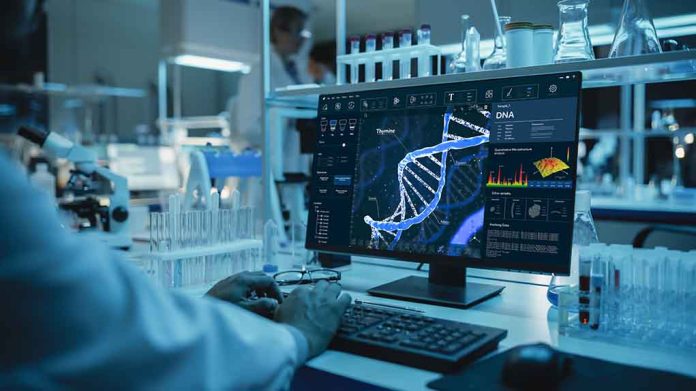
Regeneron’s $256 million acquisition of 23andMe puts the genetic data of millions of Americans in the hands of Big Pharma, raising urgent questions about who really owns your DNA information.
Key Takeaways
- Regeneron Pharmaceuticals has won the bankruptcy auction to acquire 23andMe for $256 million, gaining access to genetic data from millions of Americans
- The transaction includes 23andMe’s Personal Genome Service, research services, and biobank, but excludes the Lemonaid Health business
- Regeneron claims it will maintain consumer privacy standards, though the acquisition comes after 23andMe suffered a major data breach leading to a $30 million settlement
- Customers concerned about privacy can currently delete their genetic data from 23andMe’s database through their account settings
- The deal requires bankruptcy court and regulatory approvals, with the final transaction expected to close in Q3 2025
Big Pharma’s DNA Data Grab
Regeneron Pharmaceuticals’ strategic acquisition of 23andMe for $256 million marks a significant shift in the consumer genetics landscape. The bankruptcy auction victory gives the pharmaceutical giant access to genetic information from millions of Americans who trusted the direct-to-consumer testing company with their most personal biological data. This transaction represents more than just a business deal – it reflects the increasing corporate control over citizens’ genetic information, raising serious privacy concerns for conservatives who value personal liberty and protection from government and corporate overreach.
The deal includes 23andMe’s core assets, including its Personal Genome Service, Total Health services, research operations, and most critically, its extensive biobank of customer genetic information. What began as a pioneering consumer genetics company founded in 2006 has suffered a dramatic fall from grace, with its valuation plummeting from over $6 billion to just $50 million following a devastating data breach that led to a $30 million settlement. The company’s financial troubles ultimately forced it into bankruptcy, creating the opportunity for Regeneron to acquire its valuable genetic database.
Privacy Promises vs. Corporate Reality
Regeneron executives have been quick to make assurances about protecting customer data privacy, but many Americans remain skeptical about these promises. After all, the very purpose of the acquisition is to leverage this genetic information for pharmaceutical development. The deal structure includes provisions for working with a Customer Privacy Ombudsman, but the fundamental question remains: can Americans trust that their most intimate biological information will be protected when it’s now an asset on a corporate balance sheet?
“We assure 23andMe customers that we are committed to protecting the 23andMe dataset with our high standards of data privacy, security and ethical oversight and will advance its full potential to improve human health,” said Aris Baras, Regeneron executive.
The California Attorney General’s office has already advised 23andMe customers to delete their data from the company’s database following the bankruptcy filing – a clear indication of the governmental concerns about data security. Customers can currently remove their information through their account settings, though it remains unclear how long this option will remain available once Regeneron takes control. The acquisition is scheduled to close in the third quarter of 2025, pending bankruptcy court approval at a hearing set for June 17.
The Steep Price of Innovation
Wall Street analysts have largely supported the acquisition, framing it as a strategic investment in Regeneron’s genetics-guided research capabilities. The pharmaceutical company plans to maintain 23andMe as a wholly owned subsidiary, continuing its personal genomics services while integrating the valuable genetic data into its drug development programs. This integration represents the culmination of what many privacy advocates have long warned about – the commercialization of personal genetic information under the guise of medical advancement.
“Given Regeneron’s track record, we also believe 23andMe customers are in good hands from a privacy perspective,” said William Pickering, Bernstein analyst.
The acquisition comes amid significant leadership turmoil at 23andMe, with founder and CEO Anne Wojcicki stepping down following internal conflicts and board resignations. Wojcicki, who co-founded the company and has personal ties to the tech elite through her former marriage to Google co-founder Sergey Brin, leaves the company in a dramatically different position than the innovative startup she built. Joe Selsavage, who took over as Interim CEO, championed the deal as ensuring the continuation of the company’s mission under a “science-driven partner.”
The Conservative Perspective on Genetic Data Rights
For conservatives who prioritize individual liberties and limited corporate power, this acquisition raises fundamental questions about ownership of personal genetic information. While liberals often focus exclusively on government surveillance, this case exemplifies how private corporations can accumulate vast stores of sensitive personal data with minimal oversight. President Trump’s administration has consistently advocated for Americans’ rights against overreach by large corporate entities, particularly when it comes to personal privacy and data security.
“Joe Selsavage said, Interim Chief Executive Officer of 23andMe, expressed satisfaction in reaching an agreement with a science-driven partner that will help ensure the continuation of their mission.”
The 23andMe case should serve as a cautionary tale about the risks of entrusting private companies with highly personal information. As more Americans become aware of these concerns, we may see increased demand for stronger legal protections around genetic data privacy and ownership. Until then, consumers would be wise to carefully consider the long-term implications before sharing their genetic information with any company, regardless of the promised benefits or privacy assurances. Your DNA is your most personal asset – and in today’s corporate landscape, it may become just another commodity to be bought and sold.









